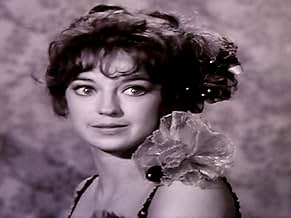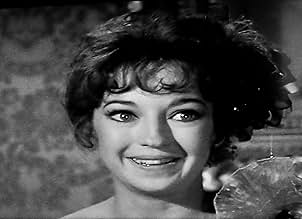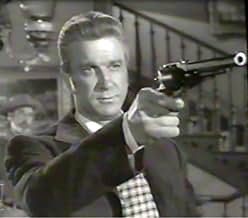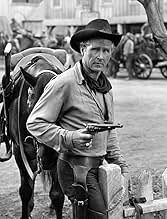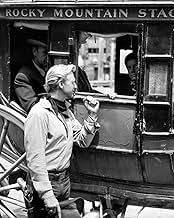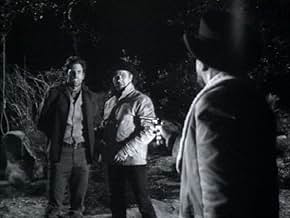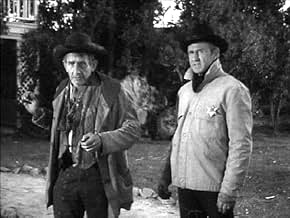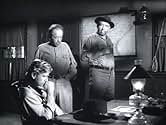The Loner
- Série de TV
- 1965–1966
- 30 min
Adicionar um enredo no seu idiomaA wandering ex-soldier encounters various problems wherever he visits in his travels.A wandering ex-soldier encounters various problems wherever he visits in his travels.A wandering ex-soldier encounters various problems wherever he visits in his travels.
Explorar episódios
Avaliações em destaque
This series, this Western Series reminded me a lot another western TV show amed THE WESTERNER, same approach, same kind of hero, or mayI say anti-hero. Many characters studies far from stereotypes and cliches. A must see.
I ADORE Rod Serling's work so I was primed to love The Loner -- and rather disappointed to find it an average western on par with others of its kind but really nothing special.
That's not to say it's bad, it's interesting enough and not as preachy as some seem to find it. In fact, it's no more moralistic than the superior Have Gun Will Travel. Each has the same premise of a man dropped into someone else's circumstances that they will attend to according to their own moral code -- but, as much as I like Lloyd Bridges, he's nowhere as compelling as Richard Boone as Palidan.
Bridges's Colton is never fleshed out enough as a character, that's a big downside making it hard to feel invested in what happens or why.
Worth a one-time watch for Serling fansbut I can't see watching it again once you have.
That's not to say it's bad, it's interesting enough and not as preachy as some seem to find it. In fact, it's no more moralistic than the superior Have Gun Will Travel. Each has the same premise of a man dropped into someone else's circumstances that they will attend to according to their own moral code -- but, as much as I like Lloyd Bridges, he's nowhere as compelling as Richard Boone as Palidan.
Bridges's Colton is never fleshed out enough as a character, that's a big downside making it hard to feel invested in what happens or why.
Worth a one-time watch for Serling fansbut I can't see watching it again once you have.
10Owlwise
Here's another of those blink-and-you-missed-it gems lost among the tide of ridiculous, cotton candy TV shows that were insulting to both adults & children alike in the mid-1960s. Rod Serling crafted something rich & meaningful in his series about a former Union officer in search of himself - and maybe America too - in the wake of the Civil War. While it clearly addressed the divisions widening in 1960s America, it's just as applicable today, when those divisions have not only reappeared but widened all the more.
But let's make one thing clear: like everything Rod Serling did, this is solid entertainment that stirs the heart as much as it engages the mind. A wonderful example of the humanist tradition in early TV its concerns are[t just social, they're very much personal. How does a man who has seen the horrors of war, participated in them himself, begin to find peace, understanding, and a place for himself in the world? For that matter, how does anyone who has lived through turmoil, hatred, death, whether in the military or not? What is a life really all about?
Wisely, "The Loner" offered no pat answers. If it offered any at all, it was that the seeking was what mattered, the continual struggle to confront both outer & inner darkness & despair, to strive for some sort of meaning in an uncertain, unmoored world.
In Lloyd Bridges, the series found its perfect lead. Capable of showing both stoic strength & revealing fears & doubts as well, he embodied a basically good & decent man with both strength & sensitivity - a man of character & soul. And he wasn't afraid to show the weaknesses that beset all men, but are seldom revealed by many, to their own further wounding. And all the while, he's searching & learning ...
Finally released on DVD, this sadly short-lived series is a treasure waiting to be discovered by anyone who loves quality TV.
But let's make one thing clear: like everything Rod Serling did, this is solid entertainment that stirs the heart as much as it engages the mind. A wonderful example of the humanist tradition in early TV its concerns are[t just social, they're very much personal. How does a man who has seen the horrors of war, participated in them himself, begin to find peace, understanding, and a place for himself in the world? For that matter, how does anyone who has lived through turmoil, hatred, death, whether in the military or not? What is a life really all about?
Wisely, "The Loner" offered no pat answers. If it offered any at all, it was that the seeking was what mattered, the continual struggle to confront both outer & inner darkness & despair, to strive for some sort of meaning in an uncertain, unmoored world.
In Lloyd Bridges, the series found its perfect lead. Capable of showing both stoic strength & revealing fears & doubts as well, he embodied a basically good & decent man with both strength & sensitivity - a man of character & soul. And he wasn't afraid to show the weaknesses that beset all men, but are seldom revealed by many, to their own further wounding. And all the while, he's searching & learning ...
Finally released on DVD, this sadly short-lived series is a treasure waiting to be discovered by anyone who loves quality TV.
Could have been a cool show, especially with Rod Serling as the writer. But he's wearing politics on his sleeve, and while many Twilight Zone episodes are cautionary tales, they relate universally.
This show, fitfully titled THE LONER, about a former soldier on an endless road happening upon various human varmints who love the thought of war without having been through it... or without having learned from what they did experience while in it... takes away from what each story could have given the viewer other than a message, which overrides each plot-line and buries the theme: to where our wandering hero seems more like a brooding know-it-all than someone making the perfect pawn upon each eclectic adventure. In other words, he has so much to teach he never actually learns anything...
And worse yet, he never seems in danger so there's little to no urgency in his would-be, world-weary travels. He simply winds up lecturing everyone not as enlightened as he is...
A lot like the political side of Hollywood, which Rod Serling was much, much better and deeper than. But he had more of a sermon to tell her than a story. See the early Gunsmoke episodes for how a great Western series should be.
This show, fitfully titled THE LONER, about a former soldier on an endless road happening upon various human varmints who love the thought of war without having been through it... or without having learned from what they did experience while in it... takes away from what each story could have given the viewer other than a message, which overrides each plot-line and buries the theme: to where our wandering hero seems more like a brooding know-it-all than someone making the perfect pawn upon each eclectic adventure. In other words, he has so much to teach he never actually learns anything...
And worse yet, he never seems in danger so there's little to no urgency in his would-be, world-weary travels. He simply winds up lecturing everyone not as enlightened as he is...
A lot like the political side of Hollywood, which Rod Serling was much, much better and deeper than. But he had more of a sermon to tell her than a story. See the early Gunsmoke episodes for how a great Western series should be.
In its own modest way, the single best television series Lloyd Bridges ever helmed. Though it only lasted 26 half-hour episodes in the mid-1960s, this rumination on the psychological and moral readjustments anguishing former Union soldier William Colton (Bridges) as he returns to the trail of a loner in post-Civil War America, had a freeform, experimental texture unlike any television western of its day -- most likely due to the significant contribution made to its teleplays by Rod Serling. Great direction and dialogue, too. The premiere episode, "An Echo of Bugles, " featuring an unforgettably poignant performance by a virtually unrecognizable Whit Bissell as "weak-as-a-kitten" former Confederate POW "Ab Nichols", sets the tone for this meditation on the lingering schizophrenia of divided loyalties that plagued our post-Lincolnian land as Grant assumed its presidency. A revelation to be rediscovered -- best writing of any TV Western I ever encountered. Truly a Western with an adult sensibility, obviously created as a centennial reflection on the aftermath of the War Between the States as seen through the eyes of the quintessential American cowboy archetype of the "loner". Serling will never be duplicated and, boy, is he missed! Haunting and haunted.
Você sabia?
- CuriosidadesLloyd Bridges' character was armed with an original M1860 Spencer carbine which was a very appropriate arm for the western period, but not the usual firearm of choice for any TV cowboy in those days. Bridges never fired his Spencer carbine although he did display it once in awhile to protect himself. The primary reason was due to the difficulty of the production company's armorer finding or making blanks of the long-obsolete .50 rim-fire cartridge the Spencer was chambered for. Reproductions of the Spencer carbine are now available in more modern calibers if they ever decide to bring back the show or add a bit more authenticity to another.
- ConexõesFeatured in American Masters: Rod Serling: Submitted for Your Approval (1995)
Principais escolhas
Faça login para avaliar e ver a lista de recomendações personalizadas
- How many seasons does The Loner have?Fornecido pela Alexa
Detalhes
- Data de lançamento
- País de origem
- Idioma
- Também conhecido como
- Cavaliere solitario
- Locações de filme
- Empresas de produção
- Consulte mais créditos da empresa na IMDbPro
- Tempo de duração30 minutos
- Cor
- Proporção
- 1.33 : 1
Contribua para esta página
Sugerir uma alteração ou adicionar conteúdo ausente

